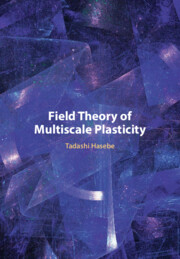Book contents
- Field Theory of Multiscale Plasticity
- Field Theory of Multiscale Plasticity
- Copyright page
- Contents
- Preface
- Acknowledgments
- Part I Fundamentals
- 1 Dislocation Theory and Metallurgy
- 2 Dislocation Dynamics and Constitutive Framework
- 3 Dislocation Substructures
- 4 Single Crystals versus Polycrystals
- Part II Theoretical Backgrounds
- Part III Applications I
- Part IV Applications II
- References
- Author Index
- Subject Index
3 - Dislocation Substructures
Universality of Cell Structures
from Part I - Fundamentals
Published online by Cambridge University Press: 14 December 2023
- Field Theory of Multiscale Plasticity
- Field Theory of Multiscale Plasticity
- Copyright page
- Contents
- Preface
- Acknowledgments
- Part I Fundamentals
- 1 Dislocation Theory and Metallurgy
- 2 Dislocation Dynamics and Constitutive Framework
- 3 Dislocation Substructures
- 4 Single Crystals versus Polycrystals
- Part II Theoretical Backgrounds
- Part III Applications I
- Part IV Applications II
- References
- Author Index
- Subject Index
Summary
Metallic materials are known to be strongly rate and history dependent, where the history includes strain, strain rate, strain path, and temperature. The history effects manifest themselves as, for example, additional hardening and softening in terms of the stress response. Since the materials inevitably experience various histories both during forming/working processes into desired shapes or structures and during operations, modeling of these history effects has been one of the most challenging and difficult problems in the field of mechanics of materials. Most of these histories are brought about by the dislocation substructures with cellular morphology evolving during plastic deformation. In other words, the information about the loading “history” is stored in the evolved/evolving dislocation cells.
Keywords
- Type
- Chapter
- Information
- Field Theory of Multiscale Plasticity , pp. 139 - 231Publisher: Cambridge University PressPrint publication year: 2024

